Lord's Prayer ad ban 'slippery slope towards censorship' - Equality Commission

The ban on an advert featuring the Lord's Prayer from being shown in cinemas could be part of a "slippery slope towards increasing censorship", and will be investigated by the Equality and Human Rights Commission, it was announced on Friday.
The decision will be examined as part of a major report on the adequacy of the law protecting freedom of religion or belief in Britain to be published early in 2016.
According to the Commission, the ban has "generated significant public concern about freedom of speech".
"We strongly disagree with the decision not to show the adverts on the grounds they might 'offend' people. There is no right not to be offended in the UK; what is offensive is very subjective and this is a slippery slope towards increasing censorship," said the chief executive of the Commission, Rebecca Hilsenrath.
"We also understand why people were confused that a commercial Christmas can be advertised but the central Christian prayer cannot. We will therefore examine the issues raised by this case as part of our major review into the law protecting freedom of religion or belief, and publish our findings in the new year."
The Church of England's advert, which features the Archbishop of Canterbury Justin Welby, was due to be shown in cinemas before screenings of Star Wars: The Force Awakens. Digital Cinema Media did not screen it on the grounds that adverts promoting "any religion, faith or equivalent systems of belief" were not allowed.
The Church said it was "bewildered" by this decision.
"The Lord's Prayer is prayed by billions of people across the globe every day and in this country has been part of everyday life for centuries," a statement from Rev Arun Arora, director of communications for the CofE, said.
"Prayer permeates every aspect of our culture from pop songs and requiems to daily assemblies and national commemorations. For millions of people in the United Kingdom, prayer is a constant part of their lives whether as part thanksgiving and praise, or as a companion through their darkest hours.
"In one way the decision of the cinemas is just plain silly but the fact that they have insisted upon it makes it rather chilling in terms of limiting free speech."
The Church last week accused cinemas of having double standards after it transpired that a short film about Hinduism is being shown before screenings of children's movie The Good Dinosaur.











